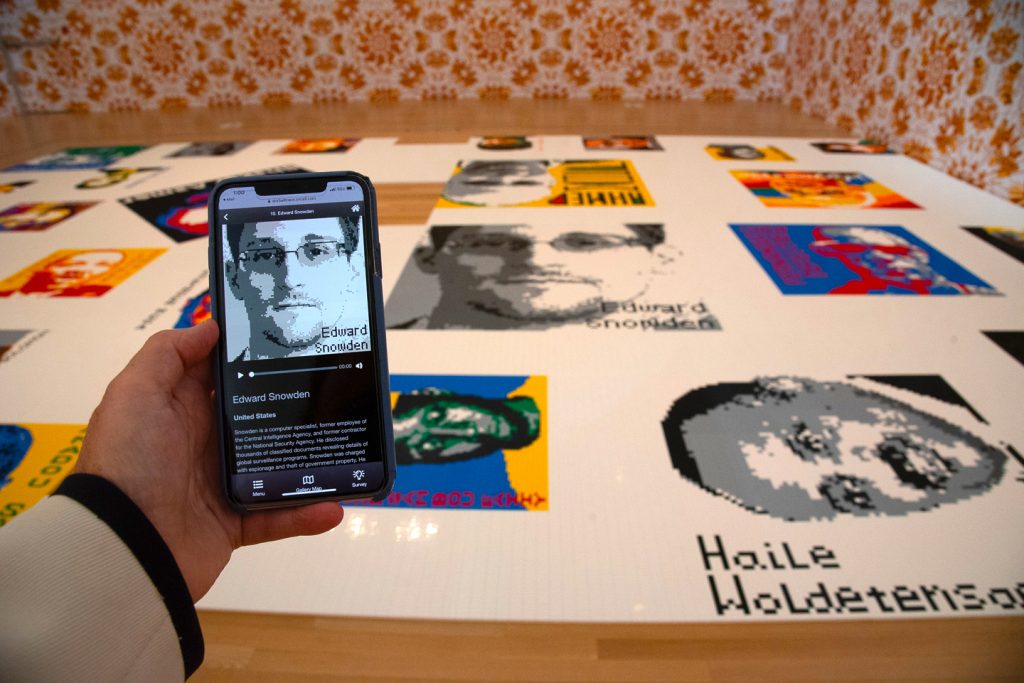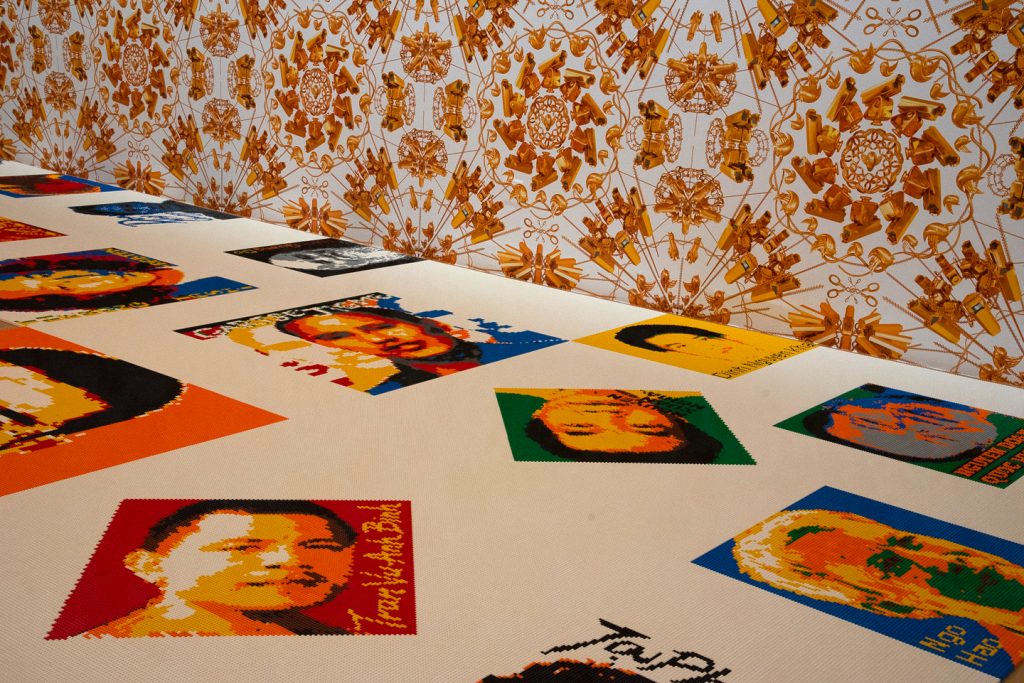
Ai Weiwei: Trace at the Skirball Cultural Center offers Angelenos the opportunity to understand one man’s legacy of artistic protest, as well as to learn about dozens of political activists throughout recent history. The exhibit, which runs through August 1, 2021, features 83 portraits made up of plastic LEGO bricks and laid out on the floor, surrounded by a wallpaper designed by the Chinese artist. Ai Weiwei, who is now banned from his native country, is renowned for an artistic practice that explores his own experience with surveillance, incarceration and interrogation. The one-room show looks deceivingly simple, but communicates the power of a single voice to protest and to seek change in the world.

The colorful portraits depict individuals from around the world whom Ai Weiwei and leading human-rights groups consider to be activists, prisoners of conscience, and advocates of free speech. The exhibit uses an excellent mobile interface (accessed easily via a QR code on your phone) to bring the remarkable stories to life. What begins as a set of inscrutable faces turns into quickly into a series of lessons on courage. Whether you agree with the actions of these activists, you will admire the power of their protest. The mini-biographies are compiled by Amnesty International, but only updated through 2017 (which may prompt you to do some post-exhibit research). They were originally created for a 2014 site-specific commission at Alcatraz State Prison in San Francisco; only three of the six panels of portraits are on display here in LA at this time. The wallpaper – entitled The Animal That Looks Like a Llama But Is Really an Alpaca – depict tools of modern surveillance in a gaudy, Gucci-esque pattern which at first seems decorative – but get up close and you’ll discover repeating patterns of Twitter birds, cameras, and handcuffs.
The subject matter is not for small children, but the topic of how our society controls thought and tries to contain the ideas of those who dare speak out is provocative for teens and those interested in human rights.
More about the artist:
One of China’s most provocative and renowned living artists, Ai Weiwei (b. Beijing, 1957) is recognized around the world as a creative force and cultural commentator. He has spent nearly four decades exploring the relationships between art, society, and individual experience. His work, as prolific as it is eclectic, encompasses a wide range of media, including sculpture, installation, photography, film, painting, and architecture. He has extended his practice across multiple disciplines and through social media to communicate with a global public and to engage fellow artists with projects on a massive scale. Born in Beijing in 1957 to renowned poet and intellectual Ai Qing, Ai grew up in the Xinjiang region, where his father was exiled in 1958under the communist regime. The artist studied at the Beijing Film Academy in 1978 before moving to the United States in 1981, where he attended the Parsons School of Design. After living in New York’s East Village for a decade, he returned to China in 1993 and helped establish the Beijing East Village contemporary art scene. In 2011, after a period of escalating conflict with Chinese authorities over his artwork, Ai was arrested for purported tax evasion. He was held for nearly three months before his release, and afterwards he was forbidden from leaving China until 2015. Ai Weiwei’s position as a dissident artist has informed the tenor and reception of much of his recent work.
The Skirball Cultural Center is located at 2701 N. Sepulveda Blvd., Los Angeles, CA 90049.Admission to Ai Weiwei:Trace is$12 General | $9 Seniors, Full-Time Students, and Children over 12 | $7 Children 2–12 | FREE to Skirball Members and Children under 2 | FREE to all on Thursdays. Advance timed-entry tickets are required. More information about visiting the exhibition on site, including new ticketing guidelines and safety protocols, is available at skirball.org.
MORE: Ai Weiwei sculptures return to LACMA –
As part of an exhibit opening on July 4, 2021 (Legacies of Exchange: Chinese Contemporary Art from the Yuz Foundation), the artist’s Circle of Animals/Zodiac Heads returns to view.
“The installation comprises 12 monumental bronze animal heads that are re-creations of the famous zodiac sculptures that once adorned the Zodiac fountain in Yuanmingyuan (Old Summer Palace), located just outside Beijing. The original sculptures, designed by European Jesuits and cast around 1750, were looted by English and French troops who took part in the destruction of Yuanmingyuan in 1860, during the Second Opium War. Ai Weiwei’s work comprises a monumental commentary on China’s tumultuous interactions with the West contextualized by the recent auctioning and repatriation of a number of the original fountainheads”.
From LACMA’s blog, Unframed

